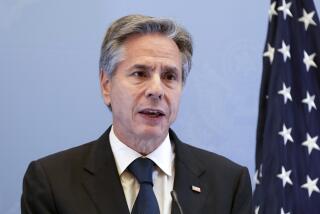Bonn to Probe Charges That Firms Helped Iran With Toxic Weapons
- Share via
MUNICH, West Germany — A senior Foreign Ministry official promised here Sunday that the Bonn government will investigate new charges that West German firms helped supply Iran with materials for the manufacture of chemical weapons.
Previously, West German companies have been implicated in helping design and construct, as well as supply, suspected poison gas factories in Iraq and Libya.
The official, Helmut Schaefer, a deputy foreign minister, was attending a defense symposium here when asked about U.S. newspaper accounts that West German firms were linked to moves by Iran to boost its inventory of chemicals used to make poison gas.
‘Deeply Embarrassed’
Schaefer said that he had no knowledge of the reports but declared: “I’m sure the accusations will be thoroughly investigated. We have to stop this business. German industry is deeply embarrassed by some of these black sheep.”
The New York Times on Sunday reported that West German companies, as well as others in the United States, Greece and Singapore, had secretly shipped chemicals to Iran.
The purchases, the account said, were arranged by the Iranian Embassy in Bonn and were first revealed by a U.S. customs check of a Bonn-based Iranian diplomat.
The whereabouts of the diplomat, identified as Seyed Kharim Ali Sobhani, were currently unknown, West German sources said.
His secret purchases were said to have been made from a West German company, Chemco, which bought thiodiglycol chemicals from a firm in Baltimore, Alcolac International, and shipped them to Iran by way of outlets in Greece and Singapore.
Mustard Gas Ingredient
Thiodiglycol is used in the manufacture of many ordinary products but it is also a key ingredient in mustard gas.
Alcolac executives said the chemicals were exported to Iran without the company’s knowledge, while Chemco officials refused to comment on the allegations.
But Peter Walaschek, a Chemco executive, pleaded guilty last Aug. 26 in U.S. court to a single count of violating U.S. export laws, stemming from a case in which he oversaw the re-export of 120 tons of thiodiglycol to Iran through Singapore and Pakistan.
In exchange for his plea and for his agreement to cooperate with U.S. investigators, Walaschek did not face charges on two other counts of violating export laws--charges that stemmed from earlier chemical shipments that he arranged for Iran.
But according to Gregg L. Bernstein, the assistant U.S. attorney in Baltimore who helped prosecute the case, Walaschek fled the United States on Dec. 1, after he began cooperating with the American investigation.
“Inasmuch as he has now fled, he has violated his plea agreement, and we do not believe we are in any way bound to the terms of the agreement,” Bernstein said. “We are pursuing all types of administrative, judicial and investigative leads to try to prosecute Mr. Walaschek.”
Bonn Aided Investigation
Bernstein said that the West German government “facilitated the search of Walaschek’s business” in the investigation leading to the executive’s arrest. But in the wake of his escape, Walaschek, who is a West German citizen, remains outside the reach of the United States, Bernstein added. West German law does not permit the extradition of its citizens.
Sources said, however, that Walaschek’s early cooperation led U.S. Customs Service investigators to other instances in which American firms may have unwittingly supplied chemical weapons components to Third World countries engaged in terrorist activities. Investigators plan to unveil some such evidence in Baltimore today.
The West German government belatedly began investigations into other West German companies that reportedly shipped equipment and supplies that ended up in chemical and biological weapons factories in Iraq--and in a Libyan plant the U.S. says is designed to make poison gas.
In Munich on Saturday, U.S. Sen. John S. McCain III accused the West German government of laxity in allowing the country’s chemical firms to export sensitive products to nations in the Middle East.
In its next issue, the national newsmagazine Der Spiegel reports that West German firms helped Iraqi research into the production of biological weapons, namely mycotoxins, which are highly poisonous substances.
Call for Allies’ Help
On Sunday morning, at the closing session of the defense symposium, U.S. Defense Secretary-designate John Tower suggested that Western European allies should consider helping the U.S. deal with military crises “out of area”--that is, in the Middle East or elsewhere.
He said that the Bush Administration will be seeking such help from members of the North Atlantic Treaty Organization.
Tower also said that the Administration will expect European allies to assume more of the “burden sharing,” allocating more of their budgets and resources to manning NATO’s defenses in Western Europe.
Times staff writer Melissa Healy in Washington contributed to this story.
More to Read
Sign up for Essential California
The most important California stories and recommendations in your inbox every morning.
You may occasionally receive promotional content from the Los Angeles Times.













